新世纪英语六年级下册知识总结
六下新世纪U1L3词汇全笔记
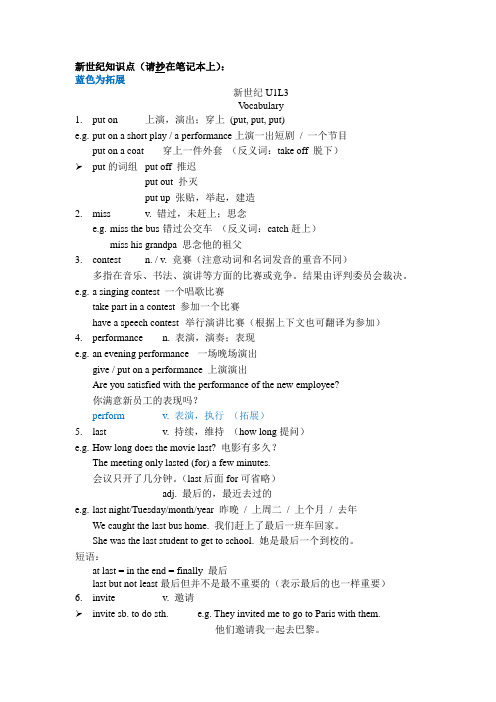
新世纪知识点(请抄在笔记本上):蓝色为拓展新世纪U1L3V ocabulary1. put on 上演,演出;穿上(put, put, put)e.g. put on a short play / a performance上演一出短剧/ 一个节目put on a coat 穿上一件外套(反义词:take off 脱下)➢put的词组put off 推迟put out 扑灭put up 张贴,举起,建造2. miss v. 错过,未赶上;思念e.g. miss the bus 错过公交车(反义词:catch赶上)miss his grandpa 思念他的祖父3. contest n. / v. 竞赛(注意动词和名词发音的重音不同)多指在音乐、书法、演讲等方面的比赛或竞争。
结果由评判委员会裁决。
e.g. a singing contest 一个唱歌比赛take part in a contest 参加一个比赛have a speech contest 举行演讲比赛(根据上下文也可翻译为参加)4. performance n. 表演,演奏;表现e.g. an evening performance 一场晚场演出give / put on a performance 上演演出Are you satisfied with the performance of the new employee?你满意新员工的表现吗?perform v. 表演,执行(拓展)5. last v. 持续,维持(how long提问)e.g. How long does the movie last? 电影有多久?The meeting only lasted (for) a few minutes.会议只开了几分钟。
(last后面for可省略)adj. 最后的,最近去过的e.g. last night/Tuesday/month/year 昨晚/ 上周二/ 上个月/ 去年We caught the last bus home. 我们赶上了最后一班车回家。
新世纪英语六年级(下册)知识总结
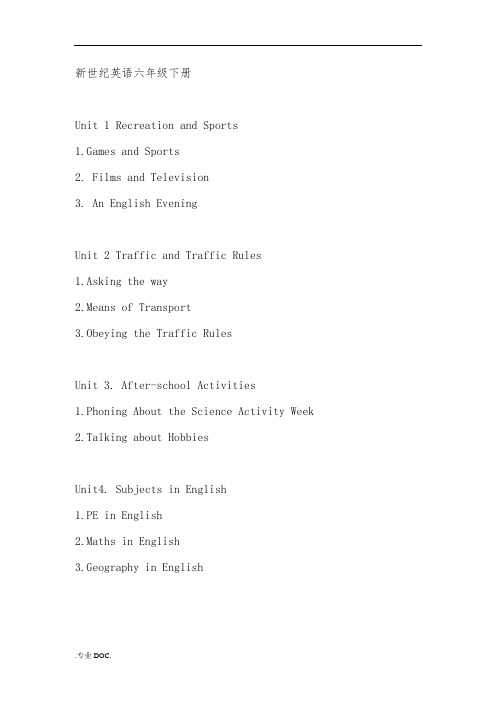
新世纪英语六年级下册Unit 1 Recreation and Sports1.Games and Sports2. Films and Television3. An English EveningUnit 2 Traffic and Traffic Rules1.Asking the way2.Means of Transport3.Obeying the Traffic RulesUnit 3. After-school Activities1.Phoning About the Science Activity Week2.Talking about HobbiesUnit4. Subjects in English1.PE in English2.Maths in English3.Geography in EnglishUnit 1 Recreation and Sports1.Games and Sports(1)句型:--Did you......?--Yes, I did. / No, I didn't.We had a wonderful time.I was / We are.....(2)语法:一般过去时12. Films and Television(1)句型:Where did you go yesterday?What did you do during the weekend? How did you like it?What did you think of it?(2)语法:一般过去时23. An English Evening(1)句型:Which....did you......?When did you.......?How long did you......?Who did you......?What a shame!(2)语法:一般过去时3Unit 2 Traffic and Traffic Rules1.Asking the way(1)句型:Excuse me. Does this bus go to...?Can you tell me the way to.....?Take the second turn on your left.--How far....?--It's within walking distance.Go straight ahead....(2)语法:问路用语Where...Can...Does this bus...How...2.Means of Transport(1) Comparatives of adjectives and adverbs 形容词和副词的比较级3.Obeying the Traffic Rules(1) Comparatives and superlatives of adjectives and adverbsUnit 3. After-school Activities1.Phoning About the Science Activity Week(1)句型:--Can I speak to Linda, Please?--Hold on. I'll get her. / Speaking.--May I ask who's calling?--This is......--May I take a message?--Yes, please. Could you ask her to.....?--May I have a message?--Sure. Please go ahead.--Shall we meet at.......?(2)灵活运用打句型2.Talking about Hobbies(1) Adverbs of Frequency频度副词1.always usually often sometimes seldom never2.everyday, three times a week, twice a week, once a week, every two weeks (2)Ordinal numbers(1)序数词1: 1-20:first second third fourth fifth sixth seventh eighth ninth tentheleventh twelfth thirteenth fourteenth fifteenth sixteenthseventeenth eighteenth nineteenth twentieth(3)句型:What's your hobby?When did you take up your hobby?How often do you / does she......?Unit4. Subjects in English1.PE in English(1) Ordinal numbers(2)序数词2:21-10021: twenty-first 22: twenty-second ...... 30: thirtieth40: fortieth50: fiftieth......100: (one) hundred101: (one) hundred and first(3)句型:Attention! Eyes right!Eyes front! At ease!2.Maths in English(1)句型:Twelve plus fifteen equals......Twenty-five minus seven equals....Thirty-three times three equals....Eight-one divided by nine equals....3.Geography in English(1) Numbers: 101--1,000,000,000(2)句型:It's the third biggest country in the world.新世纪英语六年级下册:一、重要词组及用法1、go + doinggo shopping/bowling/swimming/jogging/running/skating/traveling 去购物/打保龄球/游泳/慢跑/跑步/滑冰/旅行My sister often goes swimming at weekendsI went bowling last MondayWe will go jogging this afternoon2、like + doingI like playing tennis ballMy mother likes driving carDoes she like going shopping?3、be interested in + 名词/动名词对……感兴趣Are you interested in reading books?----Yes, I amI am interested in playing chess.4、not only.......but also..... 不但……而且(就近一致原则)Not only my father but also I am interested in playing football. Not only I but also my sister likes jogging5、enjoy oneself 玩的很开心 = have a good(wonderful) time enjoy doing sth 喜欢干某事 = like doing sthHe enjoys climbingI enjoyed myself yesterday= I had a good time yesterdayMy family enjoyed ourselves last week=My family had a good time last weekDid they enjoy themselves the day before yesterday?= Did they have a good time the day before yesterday?6、be good at+doing sth 擅长于干… = do well in doing sth My sister is good at studying English=My sister does well in studying EnjlishTom is good at playing the piano=Tom does well in playing the piano注意:b e good for:对……有有益(有好处)Reading aloud is good for EnglishUsual Jogging is good for health7、take part in 参加……活动;take an active part in,积极参加……活动Join:参加……组织(团队),并成为其中一员Liu Hui takes an active part in all kinds of sportsMy English teacher joined the party three years ago8、spend/take/cost① spend……(in)doing sth(人作主语)某人花了……做某事情spend……on sth 某人花了……在某件事上面I spent a whole day (in) playing games last weekHe spent a lot of time studying EnglishMy sister spent sixty yuan on this coat② take:花费(it作主语)重要句型:It takes(took) sb some time to do sth.做某事情花了某人多少时间It takes me half an hour to go to school on foot every dayIt took us three hours to have a meeting yesterday③ cost:花费(物作主语,某物花了某人多少钱)sth cost sb some money 某样东西花了某人多少钱This book cost me 20 yuan yesterdayThe red coat cost her 100 yuan9、a.m 上午 p.m下午by car 乘小汽车 by ship=by sea 乘轮船by air=by plane乘飞机 by underground乘地铁My sister often takes a underground to school=My sister often goes to school by underground10、go to the cinema = go to see a film 去看电影My family will go to the cinema two weeks later=My family will go to see afilm two weeks later11、in/on/at. 时间从大到小① in: 后接某年、某月和某星期(时间很大、很长)in 1998:在1998年in 2010:在2010年1n January/April/November:在一月/四月/11月in this week:在这个星期三个固定搭配in the morning在上午in the afternoon在下午in the evening在晚上② o n: 强调在某一天或者在某一天的上午、下午、晚上(时间比较短)on Monday /Wednesday/Sunday:在星期一/星期三/星期日on Monday morning:在星期一上午on Sunday evening:在星期日晚上on the afternoon of Thursday:在星期四的下午on a morning of October:在10月的某个上午on an afternoon of December 在12月的某个下午③ at: 在某一个具体的时刻或钟点(时间最小)at seven 在7点at half past ten 在10点半at 8:00 在8点固定搭配 at weekends 在周末12、keep in touch with 与某人保持联系Keep in touch with me,please13、would like + to do想要干某事= want to doWould you like to go swimming with me?=Do you want to go swimming with me?He'd like to go to the cinema next Saturday=He wants to go to the cinema next Saturday14、How do you like ……? 你认为……怎么样?= what do you think of……?How do you like Mr Zhang?你觉得先生怎么样啊=what do you think of Mr Zhang?15、how…… = what……like(……怎么样)How was the weather the day before yesterday in Shagnhai?前天天气怎么样啊=what was the weather like the day before yesterday in Shanghai?16、why don’t you do ……? 你为什么不……= why not do……?Why don't you go to the cinema with your family?=why not go to the cinema with your family?Why don't you study English hard?= why not study English hard?17、plus(加)、minus(减)、times(乘)、divide by(除)和equal(等于)Fifteen plus eight equals twenty-three (对划线部分提问)How much is fifteen plus eight?Sixteen minus seven equals nine (对划线部分提问)How much is sixteen minus seven?18、on one's way home在某人回家的路上On one's way to school/factory/library19、my pleasure(不用,别客气)= It's my pleasure= You are welcomeI'm afraid not!恐怕不行20、How far/how long/how often/how soon的用法区别① how far:多远It is about twenty minutes' walk from here to my home(对划线部分提问)How far is it from here to your home?② How long:多久It took me two hours to finish my homework(对划线部分提问)How long did it take you to finish your homework?③ How often:多久一次(对often/usually/once/twice/seldom/never/sometimes等频度副词提问)I go home once a month(对划线部分提问)How often do you go home?Liu Hui usually goes to ShagnhaiHow often does Liu Hui go to shanghai?④ how soon:多久以后I will go home in a month.(我将在一个月后回家)How soon will you go home ?They will go to Beijing in a weekHow soon will they go to Beijing?21、have to(不得不) ask for(要求)run across the street(穿过街道)22、What's wrong with …? …怎么了?What's wrong with you bike? 你的自行车怎么了?Be more careful 仔细点That's a good idea 好主意That's great 好极了Not really 不太想23、问路程Can you tell me the way to……? 你能告诉我去……的路?=can you tell me how to……?=How can I get to……?Can you tell me the way to the People's Square?=Can you tell me how to go to the People's Square?=How can I get to the People's Square?24、as……as 和……一样(中间用形容词或副词的原型)He is as tall as I 他和我一样高This room is twice as big as that one 这间房子是那间房子的两倍大Tom runs as fast as I 汤姆和我跑的一样快25、be born in…,在………(某某地方)出生(be动词用was/were)I was born in shanghaiAdd to:增加in the east of… 在…东部take a message 捎口信 hold on 请稍等,不要挂26、how about(doing )…… ,……怎么样(好不好)=what about(doing)……How about a cup of tea? 喝一杯茶怎么样啊=what about a cup of tea?How about going swimming? 去游泳好不好啊?=What about going swimming?just now 刚刚soon 不久以后27、a little/little/a few/few① a little: 一点点; little:几乎没有(后接不可数名词)There is a little milk in the glass.在玻璃杯里面有一点点牛奶There is little milk in the glass在玻璃杯里面几乎没有牛奶② a few:一些;few:几乎没有(后接可数名词复数)I have a few interesting story books我有一些有趣的故事书There are few cakes in the fridge,please go to buy some in the supermarket 冰箱里面几乎没有蛋糕了,去超市买一些来28、反义疑问句There is little bread on the desk, is there?桌子上没什么面包了,是吗There are few apples in the basket,are there篮子里面几乎没有苹果了,是吗There is no meat in the fridge, is there?He never goes to school by bike, does he?29、some/any和something/anything① some/any + 不可数名词/可数名词复数Some water/bread/orangesome或any books/knives/shelves/wolves② so me用于肯定句,any用于否定句和疑问句Liu Hui has some knivesDoes Liu Hui have any knives?(一般疑问句)Liu Hui doesn't have any knives.(否定句)③ some特殊用法:表示建议请求的一般疑问句必须用some,而不能用anyWould you like some apples?May I have some orange?30、something/anything① something相当于some 的用法,即用于肯定句中;anything 相当于any的用法,用于否定句和疑问句中② something/anything important重要的事情Something/anything new新的事情Something/anything interesting 有趣的事情31 many/much 许多Many:后接可数名词复数 many tomatoes/many potatoes/many heroesMuch:后接不可数名词 much rice/much water/much meatHow many + 可数名词复数How much + 不可数名词a lot of:许多,后接可数名词复数,也可接不可数名词a lot of wolves/children a lot of hair/sugar/salt32、used to + do(动词原型), 过去常常My sister used to jog in the morning last yearLiu Hui used to go to school by underground some years ago33、play basketball/football/tennis,Play chess(下棋)Play the piano(乐器前面家the)34、How was the weather the day before yesterday in shanghai?前天的天气怎么样啊?= what was the weather like the day before yesterday in shanghai?How is the weather today?今天天气怎么样啊=what is the weather like today?35、be proud of:以……自豪My mother is proud of my study36、get ready for= be ready for: 为………做好准备I will get ready for my holiday=I will be ready for my holidayGet ready for climbing that hill,children!37、twelve-year-oldShe is a twelve-year-old girlIt's about twenty minutes' walk38、 Wish sb to do sth:希望某人做某事Help sb do sth= help sb with sthMake/let sb do sth 9(使让动词)Let me help youhelp sb do sth,hope to do sth39、祈使句,动词原形开头Open the door,pleaseDon't open the door,please(变否定句)Open the door,will you?(反义疑问句都一样)40、名词所有格,在名词后面加('s)LiLy's coats 莉莉的外套Student s' books (以s 结尾的复数加',不用再加s)Tom、Lily and Liu Hui's classroom: 汤姆和慧的教室(两人或多人共同拥有,在最后一个名词后面加's即可)Tom's 、 Liu Hui's and Lily's coats:汤姆、慧和莉莉的外套(两人或多人分别拥有,即汤姆的外套,慧的外套和莉莉的外套)41、动词的三单形式/过去式/现在分词和形容词比较级的构成① 总原则是:在词尾加“s”、“ing”、“ed”和“er”② 以e 结尾加s、d、r③ 以辅音字母+y结尾,把y变i再加es、ed和er④ 以o 结尾加es,tomatoes/potatoes, goes/does⑤ 以x、s、sh和ch结尾加es,动词三单形式与名词单数变复数相同⑥ 特殊记忆42、比较级① 比较级构成规则,在形容词后面加er② m uch 修饰比较级,表示……得多This apple is much bigger than that one这个苹果比那个苹果大的多Yao Ming is much taller than I 明比我高的多This coat is much more expensive than that one这件外套比那件外套昂贵的多③ 比较级和最高级互相变化,需用any other(后接单数,意思是任何其它的一个)Shanghai is the biggest city in china 是中国最大的城市=Shanghai is bigger than any other city in china比中国任何一个其它城市都大Yao Ming is taller than any other man in shanghai = Yao Ming is the tallest man in Shanghai④ as……as 和……一样That classroom is as big as this one那个教室和这个教室一样大English is as difficult as Maths英语和数学一样难二词形变换1、happy(形容词:高兴的)→ happily (副词:高兴地)2、usual(形容词:经常的)→ usually (副词:经常地)3、real(形容词:真实的)→ really(副词:真实地)4、friend(名词:朋友)→ friendly(形容词:友好地)5、slow(形容词:慢的)→ slowly(副词:慢地)6、quiet(形容词:安静的)→ quietly(副词:安静地)7、heavy(形容词:重的;大量的)→ heavily(副词:沉重地;大量地)8、interest(名词:兴趣、爱好)→ interesting(形容词:有趣的,修饰事物,如:This is an interesting book)→interested (形容词:有兴趣的,固定搭配:be interested in,修饰人 I am interested in playing volleyball)9、wonder(名词:惊异、惊叹)→ wonderful(形容词:极好的、精彩的)10、fun(名词:娱乐、有趣的人或物)→ funny(形容词:有趣的、滑稽的)11、health(名词:健康, in good health 处于健康状态)→ healthy(形容词:健康的 keep healthy保持健康)12、strong(形容词:强壮的)→ strength (名词:强壮结实)13、science(名词:科学)→ scientist(名词:科学家)14、one(基数词)→ once(频度副词:一次)→ first (序数词:第一)Two(基数词)→ twice(频度副词:两次)→ second (序数词:第二)15、Three → third(序数词:第三)four → fourth(第四)five → fifth(第五)six → sixth(第六)16、know(动词:知道)→ knowledge (名词:知识、学问)17、journal(名词:杂志、日报)→ journalist(名词:新闻记者)18、rich(形容词:富裕的)→ enrich(动词:丰富、充实)19、ease(名词:舒适、悠闲)→ easy (形容词:容易的)20、difficult(形容词:难的)→ difficulty(名词:困难)21、France(法国)→ French(法语;法国人;法国/人的)China(中国)→ Chinese(中国/人的;中国人;汉语)Japan(日本)→ Japanese(日本/人的;日本人;日语)Australia(澳大利亚)→ Australian(澳大利亚人、澳大利亚/人的)America(美国)→ American(美国人;美国/人的)Russia(俄国)→ Russian(俄国人;俄国/人的)Asia (亚洲)→ Asian (亚洲的)Canada(加拿大)→ Canadian(加拿大人、加拿大/人的)England(英国)→ English(英国的;英语)22、different(形容词:不同的)→ difference(名词:不同)23、important(形容词:重要的)→ importance(名词:重要性)24、teach(动词:教、教书)→ t eacher(名词:教书)25、friend(名词:朋友)→ friendly(形容词:友好的)26、health(名词:健康)→ healthy(形容词:健康的)27、beauty(名词:美丽、漂亮)→ beautiful(形容词:漂亮的)28、danger(名词:危险)→ dangerous(形容词:危险的)29、attract(动词:吸引)→ attractive(形容词:有吸引力的)30、invite(动词:邀请)→ invitation(名词:邀请/请帖)31、tour(名词:旅行/旅游)→ tourist(名词:旅游者/旅行者)32、direct(动词:指导/指挥)→ direction(名词:指示/说明)33、care(名词:看护/小心)→ careful(形容词:仔细的,小心的)34、以o结尾加estomato(西红柿)→ tomatoes (复数)potato(马铃薯)→ potatoes((复数)hero(英雄)→ heroes(复数35、以fe结尾的名词,把fe变veswife(妻子)→ wives(复数) life(生命)→ lives(复数)knife(小刀)→ knives(复数) wolf(狼)→ wolves(复数)themselves,/ourselves/yourselves leaf (叶子)→ leaves(复数)36、特殊变化man — men mouse — mice foot — feet,woman — women tooth — teeth goose — geese,child —children37、man doctor → men doctorswoman driver → women drivers。
新世纪英语六年级第二学期总复习
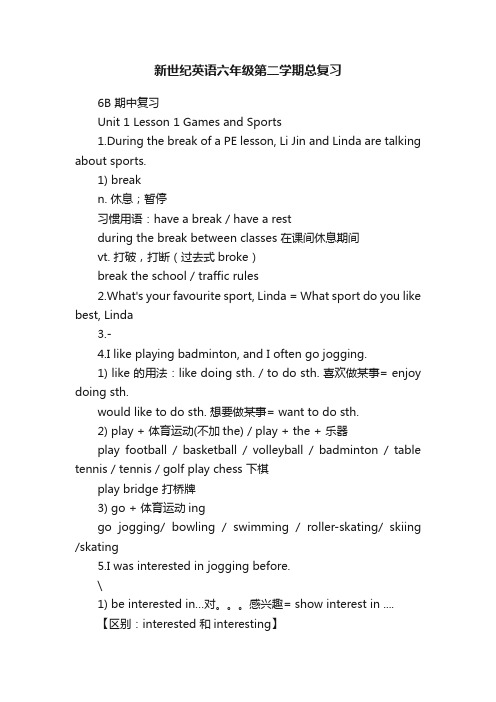
新世纪英语六年级第二学期总复习6B 期中复习Unit 1 Lesson 1 Games and Sports1.During the break of a PE lesson, Li Jin and Linda are talking about sports.1) breakn. 休息;暂停习惯用语:have a break / have a restduring the break between classes 在课间休息期间vt. 打破,打断(过去式broke)break the school / traffic rules2.What's your favourite sport, Linda = What sport do you like best, Linda3.-4.I like playing badminton, and I often go jogging.1) like 的用法:like doing sth. / to do sth. 喜欢做某事= enjoy doing sth.would like to do sth. 想要做某事= want to do sth.2) play + 体育运动(不加the) / play + the + 乐器play football / basketball / volleyball / badminton / table tennis / tennis / golf play chess 下棋play bridge 打桥牌3) go + 体育运动inggo jogging/ bowling / swimming / roller-skating/ skiing /skating5.I was interested in jogging before.\1) be interested in…对。
感兴趣= show interest in ....【区别:interested 和interesting】interested (adj.) 对……感兴趣的(修饰人). I’m interested in Maths.interesting(adj.)有趣的(修饰物). an interesting film6.Did you enjoy yourselves1) enjoy oneself = have a wonderful time = have a good time = have fun7.I was on the school football team at primary school.1) on the school football team 在学校足球队2) at primary school = at elementary school 在小学8.No wonder you look like a sportsman.;1) Now wonder 难怪wonder (n.) 奇迹the seven wonders 七大奇迹wonder(v.) 好奇= want to knowwonderful (adj.) What a wonderful idea!wonderfully (adv.) She can dance so wonderfully.2) look like 看上去像like (prep.) 像What does she look like 她长得怎么样Who does she look like 她看上去像谁3) sportsman (n.)运动员(男) sportswoman (女)sportsman -- sportsmen [pl.] sportswoman -- sportswomen [pl.]9.(10.Li Hui takes an active part in sports.1) active (adj.) 积极的,活跃的,主动的take an active part in... = join in ...actively 积极参加。
新世纪英语六年级知识点
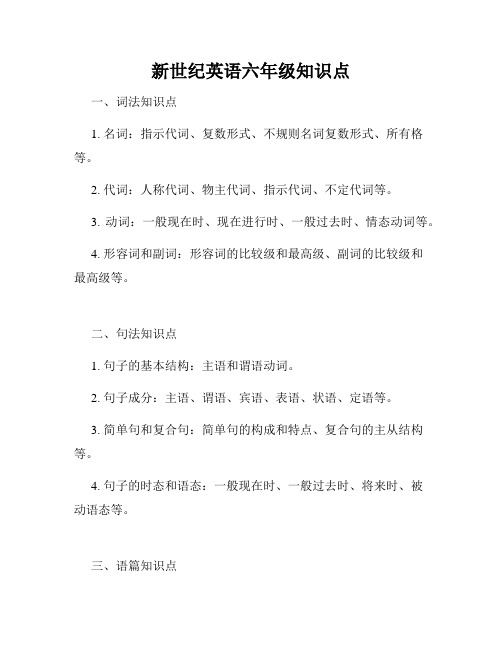
新世纪英语六年级知识点一、词法知识点1. 名词:指示代词、复数形式、不规则名词复数形式、所有格等。
2. 代词:人称代词、物主代词、指示代词、不定代词等。
3. 动词:一般现在时、现在进行时、一般过去时、情态动词等。
4. 形容词和副词:形容词的比较级和最高级、副词的比较级和最高级等。
二、句法知识点1. 句子的基本结构:主语和谓语动词。
2. 句子成分:主语、谓语、宾语、表语、状语、定语等。
3. 简单句和复合句:简单句的构成和特点、复合句的主从结构等。
4. 句子的时态和语态:一般现在时、一般过去时、将来时、被动语态等。
三、语篇知识点1. 对话:日常对话的表达方式、交际用语等。
2. 短文阅读:短文的主旨、段落的主题、段落间的逻辑关系等。
3. 阅读理解:根据问题选择正确答案、推断词义等。
4. 写作:根据题目要求进行写作、表达自己的观点和意见等。
四、听力技巧1. 听力题型:听音选图、听音排序、听音选答案等。
2. 听力技巧:注意听力材料中的关键词、注意上下文的逻辑关系等。
五、口语表达1. 日常用语:问候、道别、感谢、请求等。
2. 询问和回答:询问时间、地点、事物等。
3. 描述和叙述:描述人物、物品、地点等。
4. 接龙和衔接:用恰当的词语连接不同的句子或话题。
六、阅读技巧1. 预测:通过标题、插图或段落首句预测文章内容。
2. 理解:抓住关键词、主题词和核心句子来理解文章。
3. 推断:根据已有的信息推测文章中未提及的内容。
4. 归纳总结:通过整理核心词汇和句子来总结文章的主旨。
七、写作技巧1. 题目分析:仔细阅读题目,明确写作要求和思路。
2. 思维策划:根据题目要求,进行构思和提纲的拟定。
3. 材料收集:查找相关资料,收集写作所需的信息。
4. 语言表达:运用适当的句式、词汇和语法结构进行写作。
5. 修改润色:检查文章的语法和拼写错误,进行修改和润色。
这是关于新世纪英语六年级知识点的一些概述。
希望这些知识点可以帮助你更好地学习和掌握英语。
新世纪六年级下知识重点归纳
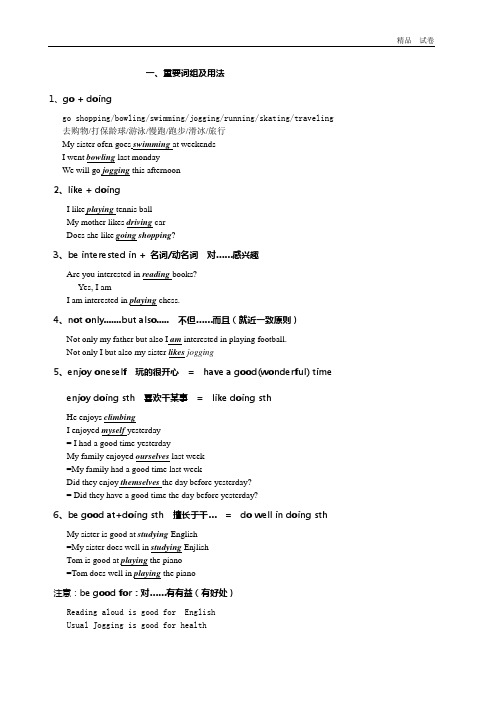
一、重要词组及用法1、go + doinggo shopping/bowling/swimming/jogging/running/skating/traveling 去购物/打保龄球/游泳/慢跑/跑步/滑冰/旅行My sister ofen goes swimming at weekendsI went bowling last mondayWe will go jogging this afternoon2、like + doingI like playing tennis ballMy mother likes driving carDoes she like going shopping?3、be interested in + 名词/动名词对……感兴趣Are you interested in reading books?----Yes, I amI am interested in playing chess.4、not only.......but also..... 不但……而且(就近一致原则)Not only my father but also I am interested in playing football.Not only I but also my sister likes jogging5、enjoy oneself 玩的很开心= have a good(wonderful) timeenjoy doing sth 喜欢干某事= like doing sthHe enjoys climbingI enjoyed myself yesterday= I had a good time yesterdayMy family enjoyed ourselves last week=My family had a good time last weekDid they enjoy themselves the day before yesterday?= Did they have a good time the day before yesterday?6、be good at+doing sth 擅长于干…= do well in doing sthMy sister is good at studying English=My sister does well in studying EnjlishTom is good at playing the piano=Tom does well in playing the piano注意:b e good for:对……有有益(有好处)Reading aloud is good for EnglishUsual Jogging is good for health7、take part in 参加……活动;take an active part in,积极参加……活动Join:参加……组织(团队),并成为其中一员Liu Hui takes an active part in all kinds of sportsMy English teacher joined the party three years ago8、spend/take/cost①spend……(in)doing sth(人作主语)某人花了……做某事情spend……on sth 某人花了……在某件事上面I spent a whole day (in) playing games last weekHe spent a lot of time studying EnglishMy sister spent sixty yuan on this coat②take:(it作主语)重要句型:It takes(took) sb some time to do sth.做某事情花了某人多少时间It takes me half an hour to go to school on foot every dayIt took us three hours to have a meeting yesterday③cost:花费(物作主语,某物花了某人多少钱)sth cost sb some money 某样东西花了某人多少钱This book cost me 20 yuan yesterdayThe red coat cost her 100 yuan9、a.m 上午p.m下午by car 乘小汽车by ship=by sea 乘轮船by air=by plane乘飞机by underground乘地铁My sister often takes a underground to school=My sister often goes to school by underground10、go to the cinema=go to see a film 去看电影My family will go to the cinema two weeks later=My family will go to see afilm two weeks later11、in/on/at. 时间从大到小①in: 后接某年、某月和某星期(时间很大、很长)in 1998:在1998年in 2010:在2010年1n January/April/November:在一月/四月/11月in this week:在这个星期三个固定搭配in the morning在上午in the afternoon在下午in the evening在晚上② on: 强调在某一天或者在某一天的上午、下午、晚上(时间比较短)on Monday /Wednesday/Sunday:在星期一/星期三/星期日on Monday morning:在星期一上午;on Sunday evening:在星期日晚上On the afternoon of Thursday:在星期四的下午on a morning of October:在10月的某个上午on an afternoon of December 在12月的某个下午③ at: 在某一个具体的时刻或钟点(时间最小)at seven 在7点 at half past ten 在10点半 at 8:00 在8点固定搭配 at weekends 在周末12、keep in touch with 与某人保持联系Keep in touch with me,please13、would like + 想要干某事= want to doWould you like to go swimming with me?=Do you want to go swimming with me?He'd like to go to the cinema next saturday=He wants to go to the cinema next satyrday14、How do you like ……? 你认为……怎么样?= what do you think of……?How do you like Mr Zhang?你觉得张先生怎么样啊=what do you think of Mr Zhang?15、how……= what……like(……怎么样)How was the weather the day before yesterday in Shagnhai?前天上海天气怎么样啊=what was the weather like the day before yesterday in Shanghai?16、why don’t you do ……? 你为什么不……= why not do……?Why don't you go to the cinema with your family?=why not go to the cinema with your family?Why don't you study English hard?= why not study English hard?17、plus(加)、minus(减)、times(乘)、divide by(除)和equal(等于)Fifteen plus eight equals twenty-three (对划线部分提问)How much is fifteen plus eight?Sixteen minus seven equals nine (对划线部分提问)How much is sixteen minus seven?18、on one's way home在某人回家的路上On one's way to school/factory/library19、my pleasure(不用谢,别客气)= It's my pleasure= You are welcomeI'm afraid not!恐怕不行20、How far/how long/how often/how soon的用法区别① how far:多远It is about twenty minutes' walk from here to my home(对划线部分提问) How far is it from here to your home?② How long:多久It took me two hours to finish my homework(对划线部分提问)How long did it take you to finish your homework?③ How often:多久一次(对often/usually/once/twice/seldom/never/sometimes等频度副词提问)I go home once a month(对划线部分提问)How often do you go home?Liu Hui usually goes to ShagnhaiHow often does Liu Hui go to shanghai?④ how soon:多久以后I will go home in a month.(我将在一个月后回家)How soon will you go home ?They will go to Beijing in a weekHow soon will they go to Beijing?21、have to(不得不) ask for(要求)run across the street(穿过街道)22、What's wrong with …? …怎么了?What's wrong with you bike? 你的自行车怎么了?Be more careful 仔细点That's a good idea 好主意That's great 好极了Not really 不太想23、问路程Can you tell me the way to……? 你能告诉我去……的路?=can you tell me how to……?=How can I get to……?Can you tell me the way to the People's Square?=Can you tell me how to go to the People's Square?=How can I get to the People's Square?24、as……as 和……一样(中间用形容词或副词的原型)He is as tall as I 他和我一样高This room is twice as big as that one 这间房子是那间房子的两倍大Tom runs as fast as I 汤姆和我跑的一样快25、be born in…,在………(某某地方)出生(be动词用was/were)I was born in shanghaiAdd to:增加 in the east of…在…东部take a message 捎口信 hold on 请稍等,不要挂电话26、how about(doing )……,……怎么样(好不好)=what about(doing)……How about a cup of tea? 喝一杯茶怎么样啊=what about a cup of tea?How about going swimming? 去游泳好不好啊?=What about going swimming?just now 刚刚soon 不久以后27、a little/little/a few/few① a little: 一点点; little:几乎没有(后接不可数名词)There is a little milk in the glass.在玻璃杯里面有一点点牛奶There is little milk in the glass在玻璃杯里面几乎没有牛奶② a few:一些;few:几乎没有(后接可数名词复数)I have a few interesting story books我有一些有趣的故事书There are few cakes in the fridge,please go to buy some in the supermarket 冰箱里面几乎没有蛋糕了,去超市买一些来28、反义疑问句There is little bread on the desk, is there?桌子上没什么面包了,是吗There are few apples in the basket,are there篮子里面几乎没有苹果了,是吗There is no meat in the fridge, is there?He never goes to school by bike, does he?29、some/any和something/anything① some/any + 不可数名词/可数名词复数Some water/bread/orange some或any books/knives/shelves/wolves② some用于肯定句,any用于否定句和疑问句Liu Hui has some knivesDoes Liu Hui have any knives?(一般疑问句)Liu Hui doesn't have any knives.(否定句)③ some特殊用法:表示建议请求的一般疑问句必须用some,而不能用anyWould you like some apples?May I have some orange?30、something/anything① something相当于some 的用法,即用于肯定句中;anything 相当于any的用法,用于否定句和疑问句中② something/anything important重要的事情Something/anything new新的事情Something/anything interesting 有趣的事情31 many/much 许多Many:后接可数名词复数 manytomatoes/many potatoes/many heroesMuch:后接不可数名词 much rice/much water/much meatHow many + 可数名词复数How much + 不可数名词a lot of:许多,后接可数名词复数,也可接不可数名词a lot of wolves/children a lot of hair/sugar/salt32、used to + do(动词原型), 过去常常My sister used to jog in the morning last yearLiu Hui used to go to school by underground some years ago33、play basketball/football/tennis,Play chess(下棋)Play the piano(乐器前面家the)34、How was the weather the day before yesterday in shanghai?前天上海的天气怎么样啊?= what was the weather like the day before yesterday in shanghai?How is the weather today?今天天气怎么样啊=what is the weather like today?35、be proud of:以……自豪My mother is proud of my study36、get ready for= be ready for: 为………做好准备I will get ready for my holiday=I will be ready for my holidayGet ready for climbing that hill,children!37、twelve-year-oldShe is a twelve-year-old girlIt's about twenty minutes' walk38、Wish sb to do sth:希望某人做某事Help sb do sth= help sb with sthMake/let sb do sth 9(使让动词)Let me help youhelp sb do sth,hope to do sth39、祈使句,动词原形开头Open the door,pleaseDon't open the door,please(变否定句)Open the door,will you?(反义疑问句都一样)40、名词所有格,在名词后面加('s)LiLy's coats 莉莉的外套Student s' books (以s 结尾的复数加',不用再加s)Tom、Lily and Liu Hui's classroom: 汤姆和刘慧的教室(两人或多人共同拥有,在最后一个名词后面加's即可)Tom's 、 Liu Hui's and Lily's coats:汤姆、刘慧和莉莉的外套(两人或多人分别拥有,即汤姆的外套,刘慧的外套和莉莉的外套)41、动词的三单形式/过去式/现在分词和形容词比较级的构成①总原则是:在词尾加“s”、“ing”、“ed”和“er”②以e 结尾加s、d、r③以辅音字母+y结尾,把y变i再加es、ed和er④以o 结尾加es,tomatoes/potatoes, goes/does⑤以x、s、sh和ch结尾加es,动词三单形式与名词单数变复数相同⑥特殊记忆42、比较级①比较级构成规则,在形容词后面加er② m uch 修饰比较级,表示……得多This apple is much bigger than that one这个苹果比那个苹果大的多Yao Ming is much taller than I姚明比我高的多This coat is much more expensive than that one这件外套比那件外套昂贵的多③比较级和最高级互相变化,需用any other(后接单数,意思是任何其它的一个)Shanghai is the biggest city in china 上海是中国最大的城市=Shanghai is bigger than any other city in china上海比中国任何一个其它城市都大Yao Ming is taller than any other man in shanghai= Yao Ming is the tallest man in Shanghai④ as……as 和……一样That classroom is as big as this one那个教室和这个教室一样大English is as difficult as Maths英语和数学一样难二词形变换1、happy(形容词:高兴的)→ happily (副词:高兴地)2、usual(形容词:经常的)→ usually (副词:经常地)3、real(形容词:真实的)→ really(副词:真实地)4、friend(名词:朋友)→ friendly(形容词:友好地)5、slow(形容词:慢的)→ slowly(副词:慢地)6、quiet(形容词:安静的)→ quietly(副词:安静地)7、heavy(形容词:重的;大量的)→ heavily(副词:沉重地;大量地)8、interest(名词:兴趣、爱好)→ interesting(形容词:有趣的,修饰事物,如:This is an interesting book)→interested (形容词:有兴趣的,固定搭配:be interested in,修饰人 I am interested in playing volleyball)9、 wonder(名词:惊异、惊叹)→ wonderful(形容词:极好的、精彩的)10、fun(名词:娱乐、有趣的人或物)→ funny(形容词:有趣的、滑稽的)11、health(名词:健康, in good health 处于健康状态)→ healthy(形容词:健康的 keep healthy保持健康)12、strong(形容词:强壮的)→ strength (名词:强壮结实)13、science(名词:科学)→ scientist(名词:科学家)14、one(基数词)→ once(频度副词:一次)→ first (序数词:第一)Two(基数词)→ twice(频度副词:两次)→ second (序数词:第二)15、Three → third(序数词:第三)four → fourth(第四)five → fifth(第五)six → sixth(第六)16、know(动词:知道)→ knowledge (名词:知识、学问)17、journal(名词:杂志、日报)→ journalist(名词:新闻记者)18、rich(形容词:富裕的)→ enrich(动词:丰富、充实)19、ease(名词:舒适、悠闲)→ easy (形容词:容易的)20、difficult(形容词:难的)→ difficulty(名词:困难)21、France(法国)→ French(法语;法国人;法国/人的)China(中国)→ Chinese(中国/人的;中国人;汉语)Japan(日本)→ Japanese(日本/人的;日本人;日语)Australia(澳大利亚)→ Australian(澳大利亚人、澳大利亚/人的) America(美国)→ American(美国人;美国/人的)Russia(俄国)→ Russian(俄国人;俄国/人的)Asia (亚洲)→ Asian (亚洲的)Canada(加拿大)→ Canadian(加拿大人、加拿大/人的)England(英国)→ English(英国的;英语)22、different(形容词:不同的)→ difference(名词:不同)23、important(形容词:重要的)→ importance(名词:重要性)24、teach(动词:教、教书)→ teacher(名词:教书)25、friend(名词:朋友)→ friendly(形容词:友好的)26、health(名词:健康)→ healthy(形容词:健康的)27、beauty(名词:美丽、漂亮)→ beautiful(形容词:漂亮的)28、danger(名词:危险)→ dangerous(形容词:危险的)29、attract(动词:吸引)→ attractive(形容词:有吸引力的)30、invite(动词:邀请)→ invitation(名词:邀请/请帖)31、tour(名词:旅行/旅游)→ tourist(名词:旅游者/旅行者)32、direct(动词:指导/指挥)→ direction(名词:指示/说明)33、care(名词:看护/小心)→ careful(形容词:仔细的,小心的)34、以o结尾加estomato(西红柿)→ tomatoes (复数)potato(马铃薯)→ potatoes((复数)hero(英雄)→ heroes(复数35、以fe结尾的名词,把fe变veswife(妻子)→wives(复数)life(生命)→lives(复数)knife(小刀)→knives(复数)wolf(狼)→wolves(复数)themselves,/ourselves/yourselves leaf (叶子)→leaves(复数)36、特殊变化man —men, mouse —mice, foot —feet,woman —women, tooth —teeth, goose —geese,child —children。
新世纪版英语六年级下学期U2L1
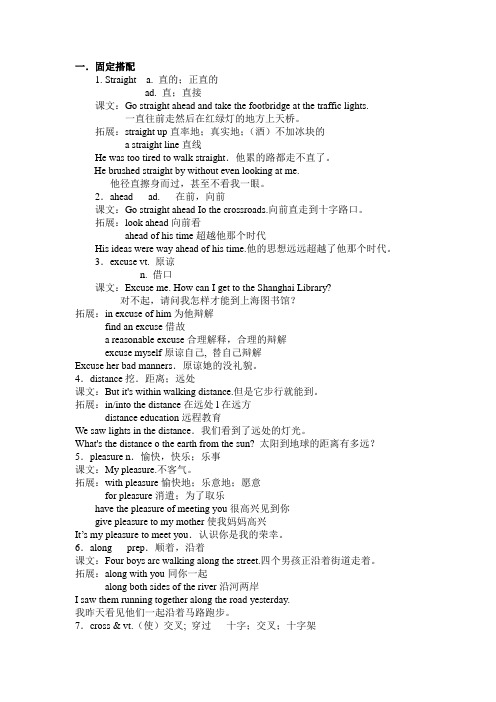
一.固定搭配1. Straight a. 直的;正直的ad. 直;直接课文:Go straight ahead and take the footbridge at the traffic lights.一直往前走然后在红绿灯的地方上天桥。
拓展:straight up直率地;真实地;(酒)不加冰块的a straight line直线He was too tired to walk straight.他累的路都走不直了。
He brushed straight by without even looking at me.他径直擦身而过,甚至不看我一眼。
2.ahead ad. 在前,向前课文:Go straight ahead Io the crossroads.向前直走到十字路口。
拓展:look ahead向前看ahead of his time超越他那个时代His ideas were way ahead of his time.他的思想远远超越了他那个时代。
3.excuse vt. 原谅n. 借口课文:Excuse me. How can I get to the Shanghai Library?对不起,请问我怎样才能到上海图书馆?拓展:in excuse of him为他辩解find an excuse借故a reasonable excuse合理解释,合理的辩解excuse myself原谅自己, 替自己辩解Excuse her bad manners.原谅她的没礼貌。
4.distance挖.距离;远处课文:But it's within walking distance.但是它步行就能到。
拓展:in/into the distance在远处l在远方distance education远程教育We saw lights in the distance.我们看到了远处的灯光。
What's the distance o the earth from the sun? 太阳到地球的距离有多远?5.pleasure n.愉快,快乐;乐事课文:My pleasure.不客气。
六年级下英语新世纪
六年级下英语新世纪第一单元四会单词:tall—taller更高的short—shorter 更矮的strong—stronger更强壮的old—older 年龄更大的young—younger 更年轻的big—bigger更大的heavy—heavier 更重的long—longer 更长的thin—thinner 更瘦的small—smaller (体型)更小的四会句型:How tall are you? 你有多高?I’m 164 cm tall. 我164 厘米高。
You’re shorter than me. 你比我矮。
You’re 4 cm taller than me.你比我高4厘米。
How heavy are you? 你有多重?I’m 48 kg. 我48千克。
第二单元:四会单词have a fever 发烧have a sore throat喉咙疼have a cold感冒have a toothache 牙疼have a headache 头疼matter事情,麻烦sore 疼的hurt疼痛nose 鼻子tired疲劳的,累的excited兴奋的angry生气的happy高兴的bored无聊的,烦人的sad 忧伤的,悲伤的四会句型:What’s the matter? 怎么了?My throat is sore. My nose hurts.我喉咙疼。
我鼻子疼。
How are you, Liu Yun? You look happy. 你好吗,刘云。
你看起来很高兴。
How are you, Sarah? You look sad today. 你好吗,Sarah?今天,你看起来很难过。
第三单元四会单词:watch—watched 看wash—washed 洗clean—cleaned打扫play—played玩visit—visited 看望do—did last weekend上一个周末go—went去go to a park—went to a park 去公园go swimming—went swimming去游泳go fishing—went fishing去钓鱼read—read 读go hiking—went hiking 去郊游四会句型:What did you do last weekend? 你上个周末干什么了?I played football. 我踢足球了。
六年级下册英语归纳知识点
六年级下册英语归纳知识点一、语法知识点1. 时态- 一般现在时:用于描述经常发生的动作或现实情况。
- 一般过去时:用于过去发生的动作或事件。
- 一般将来时:用于表示将来发生的动作或情况。
2. 名词- 可数名词与不可数名词的区别及用法。
- 单数名词和复数名词变化规则。
- 复数名词的特殊变化形式。
3. 代词- 人称代词、物主代词、反身代词等的用法和变化规则。
- 指示代词的用法和区别。
- 不定代词的用法和种类。
4. 形容词和副词- 形容词和副词的基本用法。
- 比较级和最高级形式及其用法。
- 常见形容词和副词的词义辨析。
5. 介词- 常见介词的用法和搭配。
- 表示时间、地点、方式、原因等的常用介词。
6. 动词和动词短语- 主动语态和被动语态的用法。
- 动词时态和语态的一致性。
- 动词短语的搭配和用法。
二、词汇知识点1. 常用词汇- 表达人物、动物、食物、颜色、家庭成员等的基本词汇。
- 表达时间、日期、季节、天气等的常用词汇。
- 描述性词汇和情感词汇。
2. 高频动词- 描述动作和行为的常用动词。
- 不同场景下常用的动词。
- 动作和状态动词的区别及用法。
3. 名词和形容词联想记忆- 利用名词和形容词之间的联系进行联想记忆。
- 利用形容词描述名词的特征和特点。
4. 短语和习惯用语- 常用的日常用语和交际短语。
- 不同场景下常见的习惯用语。
三、听力技巧1. 听懂对话和短文- 提高听力技巧和听辨能力。
- 注意关键词和关键信息的捕捉。
2. 图片与听力的结合- 学会通过图片来理解听力材料的信息。
- 提前观察图片中的人物和物品,加深对听力的理解。
3. 正确理解问题并作出回答- 注意听力中的问题类型,如何正确理解问题的要求。
- 灵活运用听力中的提示词来作答。
四、阅读技巧1. 预测文章内容- 根据标题、图片等先行信息预测文章的大意。
- 运用关键词和上下文推测词义。
2. 掌握文章结构- 了解文章的开头、中间和结尾的常见结构。
(完整版)六年级英语下册知识点归纳整理
(完整版)六年级英语下册知识点归纳整理
本文档旨在对六年级英语下册知识点进行归纳整理,以便学生复和掌握重要内容。
以下是本学期主要研究的知识点总结:
1. 语法知识
- 动词时态: 一般现在时、一般过去时、一般将来时
- 形容词和副词的比较级和最高级
- 名词单数变复数的规则
- 代词的用法:主格、宾格、形容词性物主代词和名词性物主代词
- 祈使句和反意疑问句的构成
- 直接引语和间接引语的转述
- 英语中常见的连词:and, but, or, so等
2. 阅读理解
- 阅读并理解文章的主旨和细节
- 根据文章内容回答问题
- 根据上下文理解词义
- 分析文章的结构和语言特点
3. 写作技巧
- 书面表达:如写作短文、日记、邮件等
- 口头表达:能够用适当的语言表达观点和意见- 写作材料的组织和结构
- 注意语法和拼写错误
4. 口语交际
- 日常交流用语:问候、介绍、道歉、邀请等- 能够用正确的语音语调进行交流
- 合作和团队合作交流的技巧
5. 听力技巧
- 能够听懂简单对话和问题
- 能够根据听到的内容回答问题和做出反应
- 提高听力技巧的方法和练
以上是六年级英语下册的主要知识点归纳整理,请同学们认真复习和巩固,以提高英语能力。
希望本文档能对学生们的学习有所帮助。
六下新世纪重点
六下新世纪重点U1L11.在一节体育课的休息期间:During the break of a PE class2.和Tom谈论运动Talk about sports with Tom3.你最喜欢的运动是什么?What’s your favourite sport?4.我喜欢打羽毛球I like playing badminton5.去慢跑go jogging6.对感兴趣be interested in be fond of be keen on7.We had a wonderful time =We enjoyed ourselves8.在学校足球队On the school football team9. 在小学at primary school10.难怪你看起来像个运动员No wonder you look like a sportsmanReading1.积极参加运动take an active part in2.一周游泳两次go swimming twice a week3.他花许多时间玩各种球类运动He spent a lot of time playing all kinds of ball games4.善于做be good at=do well in5.他有时和朋友们打桥牌He sometimes plays bridge with friends6.李辉不仅善于运动,也善于学习Lihui is not only good at sports but also good at studies1.在星期一的早晨On a Monday morning2. 怎样度过我们的周末How to spend our weekend3.和爸妈去看电影go to a movie with parents4.周末你还做些别的什么?Did you do anything special the weekend?5.不完全是Not really6.你认为…怎么样?(3个)How is/are.. sth.?=how did…like = what did you think of …1.去英语角go to the English Corner ( made two new friends 交到2个新朋友)2.一个…(两者中的)另一个one…., the other3.交换我们的电话号码和电子邮件exchange our telephone numbers and e-mail addresses4..互相保持联系keep in touch with each other5.浏览因特网持续半小时surf the internet for half an hour6.看电视新闻watch the TV news7.给我朋友寄电子邮件send e-mails to my friends8.听一个英语节目listen to an English programme9.我每分钟都很享受。
- 1、下载文档前请自行甄别文档内容的完整性,平台不提供额外的编辑、内容补充、找答案等附加服务。
- 2、"仅部分预览"的文档,不可在线预览部分如存在完整性等问题,可反馈申请退款(可完整预览的文档不适用该条件!)。
- 3、如文档侵犯您的权益,请联系客服反馈,我们会尽快为您处理(人工客服工作时间:9:00-18:30)。
新世纪英语六年级下册Unit 1 Recreation and Sports1.Games and Sports2. Films and Television3. An English EveningUnit 2 Traffic and Traffic Rules1.Asking the way2.Means of Transport3.Obeying the Traffic RulesUnit 3. After-school Activities1.Phoning About the Science Activity Week2.Talking about HobbiesUnit4. Subjects in English1.PE in English2.Maths in English3.Geography in EnglishUnit 1 Recreation and Sports1.Games and Sports(1)句型:--Did you......?--Yes, I did. / No, I didn't.We had a wonderful time.I was / We are.....(2)语法:一般过去时12. Films and Television(1)句型:Where did you go yesterday?What did you do during the weekend? How did you like it?What did you think of it?(2)语法:一般过去时23. An English Evening(1)句型:Which....did you......?When did you.......?How long did you......?Who did you......?What a shame!(2)语法:一般过去时3Unit 2 Traffic and Traffic Rules1.Asking the way(1)句型:Excuse me. Does this bus go to...?Can you tell me the way to.....?Take the second turn on your left.--How far....?--It's within walking distance.Go straight ahead....(2)语法:问路用语Where...Can...Does this bus...How...2.Means of Transport(1) Comparatives of adjectives and adverbs 形容词和副词的比较级3.Obeying the Traffic Rules(1) Comparatives and superlatives of adjectives and adverbsUnit 3. After-school Activities1.Phoning About the Science Activity Week(1)句型:--Can I speak to Linda, Please?--Hold on. I'll get her. / Speaking.--May I ask who's calling?--This is......--May I take a message?--Yes, please. Could you ask her to.....?--May I have a message?--Sure. Please go ahead.--Shall we meet at.......?(2)灵活运用打电话句型2.Talking about Hobbies(1) Adverbs of Frequency频度副词1.always usually often sometimes seldom never2.everyday, three times a week, twice a week, once a week, every two weeks (2)Ordinal numbers(1)序数词1:1-20:first second third fourth fifth sixth seventh eighth ninth tentheleventh twelfth thirteenth fourteenth fifteenth sixteenthseventeenth eighteenth nineteenth twentieth(3)句型:What's your hobby?When did you take up your hobby? How often do you / does she......?Unit4. Subjects in English1.PE in English(1) Ordinal numbers(2)序数词2:21-10021: twenty-first 22: twenty-second ...... 30: thirtieth40: fortieth50: fiftieth......100: (one) hundred101: (one) hundred and first(3)句型:Attention! Eyes right!Eyes front! At ease!2.Maths in English(1)句型:Twelve plus fifteen equals......Twenty-five minus seven equals.... Thirty-three times three equals....Eight-one divided by nine equals....3.Geography in English(1) Numbers: 101--1,000,000,000(2)句型:It's the third biggest country in the world.新世纪英语六年级下册:一、重要词组及用法1、go + doinggo shopping/bowling/swimming/jogging/running/skating/traveling 去购物/打保龄球/游泳/慢跑/跑步/滑冰/旅行My sister often goes swimming at weekendsI went bowling last MondayWe will go jogging this afternoon2、like + doingI like playing tennis ballMy mother likes driving carDoes she like going shopping?3、be interested in + 名词/动名词对……感兴趣Are you interested in reading books?----Yes, I amI am interested in playing chess.4、not only.......but also..... 不但……而且(就近一致原则)Not only my father but also I am interested in playing football.Not only I but also my sister likes jogging5、enjoy oneself 玩的很开心= have a good(wonderful) time enjoy doing sth 喜欢干某事= like doing sthHe enjoys climbingI enjoyed myself yesterday= I had a good time yesterdayMy family enjoyed ourselves last week=My family had a good time last weekDid they enjoy themselves the day before yesterday?= Did they have a good time the day before yesterday?6、be good at+doing sth 擅长于干… = do well in doing sth My sister is good at studying English=My sister does well in studying EnjlishTom is good at playing the piano=Tom does well in playing the piano注意:b e good for:对……有有益(有好处)Reading aloud is good for EnglishUsual Jogging is good for health7、take part in 参加……活动;take an active part in,积极参加……活动Join:参加……组织(团队),并成为其中一员Liu Hui takes an active part in all kinds of sportsMy English teacher joined the party three years ago8、spend/take/cost① spend……(in)doing sth(人作主语)某人花了……做某事情spend……on sth 某人花了……在某件事上面I spent a whole day (in) playing games last weekHe spent a lot of time studying EnglishMy sister spent sixty yuan on this coat② take:花费(it作主语)重要句型:It takes(took) sb some time to do sth.做某事情花了某人多少时间It takes me half an hour to go to school on foot every dayIt took us three hours to have a meeting yesterday③ cost:花费(物作主语,某物花了某人多少钱)sth cost sb some money 某样东西花了某人多少钱This book cost me 20 yuan yesterdayThe red coat cost her 100 yuan9、a.m 上午p.m下午by car 乘小汽车by ship=by sea 乘轮船by air=by plane乘飞机by underground乘地铁My sister often takes a underground to school=My sister often goes to school by underground10、go to the cinema = go to see a film 去看电影My family will go to the cinema two weeks later=My family will go to see afilm two weeks later11、in/on/at. 时间从大到小①in: 后接某年、某月和某星期(时间很大、很长)in 1998:在1998年in 2010:在2010年1n January/April/November:在一月/四月/11月in this week:在这个星期三个固定搭配in the morning在上午in the afternoon在下午in the evening在晚上②on: 强调在某一天或者在某一天的上午、下午、晚上(时间比较短)on Monday /Wednesday/Sunday:在星期一/星期三/星期日on Monday morning:在星期一上午on Sunday evening:在星期日晚上on the afternoon of Thursday:在星期四的下午on a morning of October:在10月的某个上午on an afternoon of December 在12月的某个下午③at: 在某一个具体的时刻或钟点(时间最小)at seven 在7点at half past ten 在10点半at 8:00 在8点固定搭配at weekends 在周末12、keep in touch with 与某人保持联系Keep in touch with me,please13、would like + to do想要干某事= want to doWould you like to go swimming with me?=Do you want to go swimming with me?He'd like to go to the cinema next Saturday=He wants to go to the cinema next Saturday14、How do you like ……? 你认为……怎么样?= what do you think of……?How do you like Mr Zhang?你觉得张先生怎么样啊=what do you think of Mr Zhang?15、how…… = what……like(……怎么样)How was the weather the day before yesterday in Shagnhai?前天上海天气怎么样啊=what was the weather like the day before yesterday in Shanghai?16、why don’t you do ……? 你为什么不……= why not do……?Why don't you go to the cinema with your family?=why not go to the cinema with your family?Why don't you study English hard?= why not study English hard?17、plus(加)、minus(减)、times(乘)、divide by(除)和equal(等于)Fifteen plus eight equals twenty-three (对划线部分提问)How much is fifteen plus eight?Sixteen minus seven equals nine (对划线部分提问)How much is sixteen minus seven?18、on one's way home在某人回家的路上On one's way to school/factory/library19、my pleasure(不用谢,别客气)= It's my pleasure= You are welcomeI'm afraid not!恐怕不行20、How far/how long/how often/how soon的用法区别①how far:多远It is about twenty minutes' walk from here to my home(对划线部分提问)How far is it from here to your home?② How long:多久It took me two hours to finish my homework(对划线部分提问)How long did it take you to finish your homework?③ How often:多久一次(对often/usually/once/twice/seldom/never/sometimes等频度副词提问) I go home once a month(对划线部分提问)How often do you go home?Liu Hui usually goes to ShagnhaiHow often does Liu Hui go to shanghai?④ how soon:多久以后I will go home in a month.(我将在一个月后回家)How soon will you go home ?They will go to Beijing in a weekHow soon will they go to Beijing?21、have to(不得不)ask for(要求)run across the street(穿过街道)22、What's wrong with …? …怎么了?What's wrong with you bike? 你的自行车怎么了?Be more careful 仔细点That's a good idea 好主意That's great 好极了Not really 不太想23、问路程Can you tell me the way to……? 你能告诉我去……的路?=can you tell me how to……?=How can I get to……?Can you tell me the way to the People's Square?=Can you tell me how to go to the People's Square?=How can I get to the People's Square?24、as……as 和……一样(中间用形容词或副词的原型)He is as tall as I 他和我一样高This room is twice as big as that one 这间房子是那间房子的两倍大Tom runs as fast as I 汤姆和我跑的一样快25、be born in…,在………(某某地方)出生(be动词用was/were)I was born in shanghaiAdd to:增加in the east of… 在…东部take a message 捎口信hold on 请稍等,不要挂电话26、how about(doing )…… ,……怎么样(好不好)=what about(doing)……How about a cup of tea? 喝一杯茶怎么样啊=what about a cup of tea?How about going swimming? 去游泳好不好啊?=What about going swimming?just now 刚刚soon 不久以后27、a little/little/a few/few① a little: 一点点;little:几乎没有(后接不可数名词)There is a little milk in the glass.在玻璃杯里面有一点点牛奶There is little milk in the glass在玻璃杯里面几乎没有牛奶② a few:一些;few:几乎没有(后接可数名词复数)I have a few interesting story books我有一些有趣的故事书There are few cakes in the fridge,please go to buy some in the supermarket 冰箱里面几乎没有蛋糕了,去超市买一些来28、反义疑问句There is little bread on the desk, is there?桌子上没什么面包了,是吗There are few apples in the basket,are there篮子里面几乎没有苹果了,是吗There is no meat in the fridge, is there?He never goes to school by bike, does he?29、some/any和something/anything①some/any + 不可数名词/可数名词复数Some water/bread/orangesome或any books/knives/shelves/wolves②some用于肯定句,any用于否定句和疑问句Liu Hui has some knivesDoes Liu Hui have any knives?(一般疑问句)Liu Hui doesn't have any knives.(否定句)③some特殊用法:表示建议请求的一般疑问句必须用some,而不能用anyWould you like some apples?May I have some orange?30、something/anything①something相当于some 的用法,即用于肯定句中;anything 相当于any的用法,用于否定句和疑问句中②something/anything important重要的事情Something/anything new新的事情Something/anything interesting 有趣的事情31 many/much 许多Many:后接可数名词复数many tomatoes/many potatoes/many heroesMuch:后接不可数名词much rice/much water/much meatHow many + 可数名词复数How much + 不可数名词a lot of:许多,后接可数名词复数,也可接不可数名词a lot of wolves/children a lot of hair/sugar/salt32、used to + do(动词原型), 过去常常My sister used to jog in the morning last yearLiu Hui used to go to school by underground some years ago33、play basketball/football/tennis,Play chess(下棋)Play the piano(乐器前面家the)34、How was the weather the day before yesterday in shanghai?前天上海的天气怎么样啊?= what was the weather like the day before yesterday in shanghai?How is the weather today?今天天气怎么样啊=what is the weather like today?35、be proud of:以……自豪My mother is proud of my study36、get ready for= be ready for: 为………做好准备I will get ready for my holiday=I will be ready for my holidayGet ready for climbing that hill,children!37、twelve-year-oldShe is a twelve-year-old girlIt's about twenty minutes' walk38、Wish sb to do sth:希望某人做某事Help sb do sth= help sb with sthMake/let sb do sth 9(使让动词)Let me help youhelp sb do sth,hope to do sth39、祈使句,动词原形开头Open the door,pleaseDon't open the door,please(变否定句)Open the door,will you?(反义疑问句都一样)40、名词所有格,在名词后面加('s)LiLy's coats 莉莉的外套Student s' books (以s 结尾的复数加',不用再加s)Tom、Lily and Liu Hui's classroom: 汤姆和刘慧的教室(两人或多人共同拥有,在最后一个名词后面加's即可)Tom's 、Liu Hui's and Lily's coats:汤姆、刘慧和莉莉的外套(两人或多人分别拥有,即汤姆的外套,刘慧的外套和莉莉的外套)41、动词的三单形式/过去式/现在分词和形容词比较级的构成①总原则是:在词尾加“s”、“ing”、“ed”和“er”②以e 结尾加s、d、r③以辅音字母+y结尾,把y变i再加es、ed和er④以o 结尾加es,tomatoes/potatoes, goes/does⑤以x、s、sh和ch结尾加es,动词三单形式与名词单数变复数相同⑥特殊记忆42、比较级①比较级构成规则,在形容词后面加er② m uch 修饰比较级,表示……得多This apple is much bigger than that one这个苹果比那个苹果大的多Yao Ming is much taller than I 姚明比我高的多This coat is much more expensive than that one这件外套比那件外套昂贵的多③比较级和最高级互相变化,需用any other(后接单数,意思是任何其它的一个)Shanghai is the biggest city in china 上海是中国最大的城市=Shanghai is bigger than any other city in china上海比中国任何一个其它城市都大Yao Ming is taller than any other man in shanghai = Yao Ming is the tallest man in Shanghai④ as……as 和……一样That classroom is as big as this one那个教室和这个教室一样大English is as difficult as Maths英语和数学一样难二词形变换1、happy(形容词:高兴的)→ happily (副词:高兴地)2、usual(形容词:经常的)→ usually (副词:经常地)3、real(形容词:真实的)→ really(副词:真实地)4、friend(名词:朋友)→ friendly(形容词:友好地)5、slow(形容词:慢的)→ slowly(副词:慢地)6、quiet(形容词:安静的)→ quietly(副词:安静地)7、heavy(形容词:重的;大量的)→ heavily(副词:沉重地;大量地)8、interest(名词:兴趣、爱好)→ interesting(形容词:有趣的,修饰事物,如:This is an interesting book)→interested (形容词:有兴趣的,固定搭配:be interested in,修饰人I am interested in playing volleyball)9、wonder(名词:惊异、惊叹)→ wonderful(形容词:极好的、精彩的)10、fun(名词:娱乐、有趣的人或物)→ funny(形容词:有趣的、滑稽的)11、health(名词:健康, in good health 处于健康状态)→ healthy(形容词:健康的keep healthy保持健康)12、strong(形容词:强壮的)→ strength (名词:强壮结实)13、science(名词:科学)→ scientist(名词:科学家)14、one(基数词)→ once(频度副词:一次)→ first (序数词:第一)Two(基数词)→ twice(频度副词:两次)→ second (序数词:第二)15、Three → third(序数词:第三)four → fourth(第四)five → fifth(第五)six → sixth(第六)16、know(动词:知道)→ knowledge (名词:知识、学问)17、journal(名词:杂志、日报)→ journalist(名词:新闻记者)18、rich(形容词:富裕的)→ enrich(动词:丰富、充实)19、ease(名词:舒适、悠闲)→ easy (形容词:容易的)20、difficult(形容词:难的)→ difficulty(名词:困难)21、France(法国)→ French(法语;法国人;法国/人的)China(中国)→ Chinese(中国/人的;中国人;汉语)Japan(日本)→ Japanese(日本/人的;日本人;日语)Australia(澳大利亚)→ Australian(澳大利亚人、澳大利亚/人的)America(美国)→American(美国人;美国/人的)Russia(俄国)→ Russian(俄国人;俄国/人的)Asia (亚洲)→ Asian (亚洲的)Canada(加拿大)→ Canadian(加拿大人、加拿大/人的)England(英国)→ English(英国的;英语)22、different(形容词:不同的)→ difference(名词:不同)23、important(形容词:重要的)→ importance(名词:重要性)24、teach(动词:教、教书)→ teacher(名词:教书)25、friend(名词:朋友)→ friendly(形容词:友好的)26、health(名词:健康)→ healthy(形容词:健康的)27、beauty(名词:美丽、漂亮)→ beautiful(形容词:漂亮的)28、danger(名词:危险)→ dangerous(形容词:危险的)29、attract(动词:吸引)→ attractive(形容词:有吸引力的)30、invite(动词:邀请)→ invitatio n(名词:邀请/请帖)31、tour(名词:旅行/旅游)→ tourist(名词:旅游者/旅行者)32、direct(动词:指导/指挥)→ direction(名词:指示/说明)33、care(名词:看护/小心)→ careful(形容词:仔细的,小心的)34、以o结尾加estomato(西红柿)→ tomatoes (复数)potato(马铃薯)→ potatoes((复数)hero(英雄)→ heroes(复数35、以fe结尾的名词,把fe变veswife(妻子)→ wives(复数)life(生命)→ lives(复数)knife(小刀)→ knives(复数)wolf(狼)→ wolves(复数)themselves,/ourselves/yourselves leaf (叶子)→ leaves(复数)36、特殊变化man — men mouse — mice foot — feet,woman — women tooth — teeth goose — geese,child —children37、man doctor → men doctorswoman driver → women drivers。
